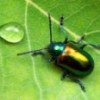 My copy arrived from Amazon the day before yesterday. I've not given it anything more than a couple cursory thumb-throughs, but I'm immediately left with the impression of schizophrenia.
My copy arrived from Amazon the day before yesterday. I've not given it anything more than a couple cursory thumb-throughs, but I'm immediately left with the impression of schizophrenia.
The bits on social organization, behavior, communication, and levels of selection- mostly Bert Hoelldobler's sections- seem an engaging and modern review, while the chapters dealing with ant history and evolution- Wilson's area- are... How do I say this diplomatically? Rubbish.
The past ten years have brought immeasurable advances in our knowledge of ant evolution, both in breadth and detail. Inexplicably, Wilson fails to recognize it. Really. He cites some recent paleontology but next to none of the large and growing body of genetic work. He reproduces the phylogeny of Moreau et al (2006), but the accompanying text reveals that he does not understand its meaning, nor that it can and is being used to connect the vast body of previously disparate natural history tidbits that Wilson himself relates throughout the book.  At best, Wilson's section is charming but irrelevant, at worst it will serve to further confuse a field that is already finding clarity independent of Wilson.  We could use a comprehensive reference detailing the great evolutionary story of the ants, but at first glance this isn't it.
Oh, and the production value is high. It's a weighty, glossy, attractive book. Lots of illustrations. The sort of thing that on a coffee table is sure to impress, even if you don't plan on opening it.
I'll post more detailed comments as I give it a more proper reading.

How disappointing...but not entirely unexpected given Wilson's more recent journal publications.
Is it fair to say it's an updated version of "The Ants," or is it a mostly a different topic all together?
I got mine about 10 days ago and haven't penetrated it too deeply, yet, either. But I share your sense of the evolution chapter. I was hoping for a thorough review and perhaps a sprinkling of new insights, and got neither. I can't even say I found it charming, as it is both outdated and in some places outright erroneous.
A hugely annoying aspect of the book -- FOOTNOTES!!! No literature cited, just footnotes. Pa-leease!
It's interesting to hear that Wilson is being left behind, if that's one way to look at it.
I wasn't sure if I wanted to read this book, but now I know I won't bother.
Aydin- I'm not dissing the entire book. It has plenty of worthwhile coverage of the studies of colony regulation, social structure, communication, and so forth. My disappointment is limited to the specific chapters on the evolutionary history of ants, which I may be blowing out of proportion as that is my own area of research.
MrILTA- It's kind of intermediate between "The Ants" and "Journey to the Ants", but with information on the other social insects added in and with some nice summaries of the newer genomic research that's happened in the intervening years.
Well, I suppose you have to consider that E. O. Wilson, despite all his acheivements in his field in the past, is now, at 79, "no spring chicken" (as my sister likes to say). I know very few people who are still sharp and up-to-date on current issues at that age, so perhaps it's not surprising that his writing lacks much new content, although that doesn't excuse him of its absence.
The chapter on ponerines does what the evolution chapter didn't. Reading this chapter (and the works upon which it is based), it becomes ironic that Latreille chose to call the type genus of this subfamily Ponera, which loosely translates as the wretched or pauper ant. The lives of the ponerine ants that have been studied are quite rich in their own ways, full of intrigue and complexity.
I expect this to arrive this week. So, what is the final verdict, is the ant evolution chapter just a one lone "mistake" or are there problems with other chapters too?
At least that Myrmecological News review seems kind of a positive...
Dark Herring-
My overall impression of the book is positive. Well worth the purchase price. My gripe is mainly with Wilson's section on ant evolution.
Good to know my money was not wasted.
Thanks for the great blog!
The sections dealing with behavior are fine. I agree with Alex about the poor coverage in the phylogeny section. Readers can be aware of two names misspelled: Brownimyrmeciinae subfamily (page 316) and Brownimyrmecia genus (page 318). The correct names are Brownimeciinae and Brownimecia (Bolton 2003).